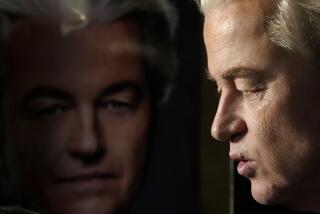Maverick Dutch Politician Is Slain Before Elections
- Share via
PARIS — Dutch politician Pim Fortuyn, a populist maverick whose criticism of immigration and Islam propelled his rapid rise, was shot and killed Monday outside a radio studio in an Amsterdam suburb.
The assassination, which Dutch authorities said was the first in the modern history of the Netherlands, came nine days before legislative elections in which the rightist politician’s fledgling party is a top contender.
The killing was especially shocking because the 54-year-old Fortuyn, an openly gay sociology professor, was an overnight phenomenon who had shaken up a tranquil nation with his aggressive and colorful style.
Police arrested a suspect in the killing, whom they described as a white man of Dutch nationality, but they didn’t identify him or provide other details. An eyewitness told The Times that the assassin was a short, youthful man wearing a baseball cap who opened fire at close range as Fortuyn walked to his car after an interview at the Radio 3 FM station in the town of Hilversum.
Fortuyn was hit six times in the head, neck and chest, authorities said. He died on the pavement where he had fallen, surrounded by a team of paramedics trying to revive him.
His death transformed him into an instant symbol of a Europe besieged by internal tensions and crises: immigration, street violence, extremism of many stripes, anti-Semitic and anti-Islamic sentiment and resentment of traditional leaders seen as out of touch and unresponsive.
“This was not an attack on Pim Fortuyn but an attack on democracy,” Dutch Prime Minister Wim Kok said at a news conference. “Political differences are resolved not with bullets but with words.”
Paul Vander Lugt, coordinator of the radio station, said he escorted Fortuyn to the exit of the studio and shook hands with him about 6 p.m. Fortuyn and his chauffeur had walked about 30 yards into a parking lot when the gunman appeared and fired without a word, Vander Lugt said.
“I had just said goodbye to Mr. Pim,” Vander Lugt said in a telephone interview. “He walked to the car with one of my disc jockeys. And a man with a baseball cap started shooting. He was very close.”
Like other rightist leaders gaining ground in Europe, Fortuyn had called for tough measures against crime and immigration, and curbing a generous welfare state. He angered opponents with claims that the country’s Islamic community resists integration and poses a risk of social conflict and that religious fundamentalism is incompatible with the permissive and tolerant Dutch society.
But he insisted that he wasn’t a bigot. He repeatedly condemned Jean-Marie Le Pen, the veteran far-right candidate who lost France’s presidential election Sunday, for his ties to neo-fascism and anti-Semitism.
“Right-wing in Holland is left of the [conservative] Tories in England,” Fortuyn said in an interview published in Britain’s Daily Telegraph newspaper Saturday. “I’m not anti-Muslim; I’m not anti-immigration. I’m saying we’ve got big problems in our cities. It’s not very smart to make the problem bigger by letting in millions more immigrants from rural Muslim cultures that don’t assimilate.”
With his blunt eloquence, chauffeur-driven Daimler and flashy ties and matching handkerchiefs, Fortuyn attracted voters across the varied ethnic spectrum of his native Rotterdam, a decaying port town whose population is about 40% foreign-born. The Netherlands has a population of 16million people, including an estimated 2million immigrants, about 800,000 of them Muslims.
Fortuyn charged out of nowhere into Dutch politics when his neophyte party, Livable Rotterdam, won 17 of 45 city council seats in March. Saying it was simplistic to call Fortuyn a candidate of reactionary nationalists, city officials pointed out that Fortuyn’s free-market, law-and-order message won 20% of the votes in a polling place set up in a mosque.
Admirers said Fortuyn forced a society renowned for tolerant laws regarding gay marriage, euthanasia, prostitution and drugs to confront the effect of immigrants on one of Europe’s most densely populated countries. Rather than demanding deportation of immigrants, as Le Pen has, Fortuyn wanted the Dutch to close borders to new entrants--”the Netherlands is full,” he declared--and work harder at assimilating foreigners already in the country.
But critics said Fortuyn crossed the line in his best-selling book about the “Islamicization” of the country and with his comment that Islam is “a backward culture.” He was expelled from his political party and created a new movement, Pim Fortuyn’s List, for the May 15 parliamentary elections.
His charisma stoked the growth of his movement, which included nonwhite candidates, leading to predictions that he would be a player in the next government. His aides thought that his accelerating popularity might propel him to the top. “The chance that he would be prime minister was growing by the day,” his spokesman, Warner Dam, said in a television interview Monday night.
Along with favorable poll numbers came insults and recent death threats, “especially from the extreme left,” Dam said. “Of course he was afraid, but he didn’t want it to rule his life.”
In one recent incident, two assailants hit Fortuyn in the face with urine-laced pies. Although bodyguards are rare among Dutch candidates Fortuyn moved with private security guards. The police kept close watch on Fortuyn’s villa in central Rotterdam, Dam said.
More to Read
Sign up for Essential California
The most important California stories and recommendations in your inbox every morning.
You may occasionally receive promotional content from the Los Angeles Times.












